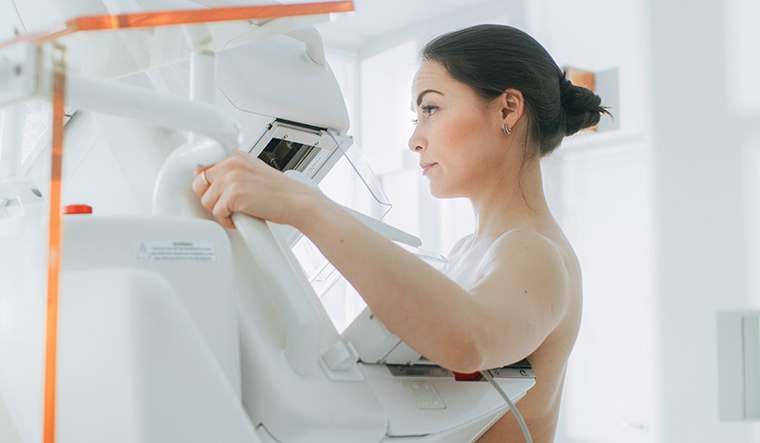The world's first baby born to a woman who had a uterus transplant from a deceased donor is healthy and thriving, Brazilian doctors have reported in the journal The Lancet.
There have been 11 successful pregnancies so far using uterus transplants from live donors. But this is the first case of successful pregnancy using uterus from a deceased donor.
The donor was a 45-year-old woman and had three children, and had died of a stroke. The recipient was a 32-year-old woman who was born without a uterus.
The uterus from the deceased donor was implanted during a ten-hour operation in September 2016. The recipient received immunosuppression therapy, which was continued until the baby's birth.
The woman underwent in vitro fertilisation before the transplant, and the resulting embryo was implanted seven months after the transplant.
The baby girl was delivered by C-section on December 15, 2017, at 35 weeks and three days. The only complication during pregnancy was a kidney infection, and it was treated with antibiotics. Nearly a year later, both mother and baby are healthy and the baby is growing normally.
Oversleeping kills
According to a study published in the European Heart Journal, people who slept more than six to eight hours a day (daytime naps included) had an increased risk of dying or developing cardiovascular diseases.
The study included 1,16,632 adults aged between 35 and 70 years in 21 countries with different income levels in seven geographic regions, including South Asia.
During an average follow-up of eight years, 4,381 people died and 4,365 suffered a major cardiovascular event, such as a heart attack or stroke.
Compared to people who slept for the recommended six to eight hours a day, those who slept a total of eight to nine hours a day had 5 per cent increased risk; the risk was 17 per cent higher for those who slept nine to ten hours a day and 41 per cent higher for those who slept more than ten.
People who slept a total of six or fewer hours also had a 9 per cent increased risk. Regular daytime naps that varied from 30 to 60 minutes are common in the Middle East, China, Southeast Asia and South America.
Daytime nap is associated with a slightly increased risk for major cardiovascular events and deaths in people who slept more than six hours at night, but not in people who slept six or fewer hours at night.
Did You Know
Holidays can be hard on the heart: overall risk of a heart attack during Christmas/New Year's was 15 per cent higher than a regular December day. The risk peaked on Christmas Eve to 37 per cent and is highest at 10pm. The risk was 20 per cent higher on New Year's Day.
The BMJ
Statins: benefits far outweigh risks
The benefits of taking statins (cholesterol-lowering drugs) far outweigh the risks, according to a scientific statement from the American Heart Association published in the journal Arteriosclerosis, Thrombosis and Vascular Biology.
Statins are used to reduce low-density lipoprotein, or LDL (bad) cholesterol. Statins can lower the risk of heart attacks and strokes, and even death from cardiovascular diseases.
The scientific statement was based on a review of several studies evaluating the safety and potential side-effects of statins. About 10 per cent of people stop taking statins because of symptoms that they assume are due to the drug. The statement addresses several side-effects associated with statins including muscle pain, muscle weakness and type 2 diabetes.
The only worrisome side-effect is rhabdomyolysis, which can result in acute kidney failure and affects less than 0.1 per cent of patients on statin therapy. It is marked by a noticeable symptom—dark urine. Patients who see this sign should stop taking statins and contact their doctor.
Statins were not associated with a greater risk of other possible side-effects including liver damage, cancer, cognitive dysfunction, neurological effects, peripheral neuropathy, cataracts, tendon ruptures or erectile dysfunction.
Avoid taking fluoroquinolones
Taking a class of antibiotics called fluoroquinolones can increase the risk of heart vessel tears, the US Food and Drug Administration has warned.
These antibiotics can cause serious events of ruptures or tears of the aorta, the main artery of the body that carries oxygen-rich blood from your heart to the rest of your body.
Aortic dissections, or ruptures of an aortic aneurysm can lead to dangerous bleeding or even death.
Fluoroquinolones are a widely used class of antibiotics, especially for upper respiratory infections. They include ciprofloxacin, levofloxacin, gemifloxacin, and moxifloxacin. They have been used for more than 30 years.
These ruptures can occur with fluoroquinolones, taken as a pill or through an injection.
People with a history of blockages or aneurysms (abnormal bulges) of the aorta or other blood vessels, high blood pressure, certain genetic disorders such as Marfan syndrome and Ehlers-Danlos syndrome that involve blood vessel changes, and the elderly are particularly at risk. Fluoroquinolones should not be used in these patients unless there are no other treatment options.
Mammograms save lives
According to a study published in the journal Cancer, women who take part in breast screening have a significantly greater benefit from treatments than those who are not screened.
The study included 52,438 Swedish women aged 40 to 69 years during a 39-year period. The researchers looked at the annual incidence of breast cancers, causing death within 10 years and within 20 years after breast cancer diagnosis.
All patients received stage-specific cancer treatment according to the latest national guidelines, irrespective of the mode of detection.
Women who participated in an organised breast cancer screening programme had a 60 per cent lower risk of dying from breast cancer within 10 years after diagnosis, and a 47 per cent lower risk of dying from breast cancer within 20 years after diagnosis.
The authors say that this benefit could be attributed to early detection. Screening detects cancers at an earlier stage when they respond much better to treatment.
Did You Know
Moderate intensity aerobic exercise, two to three times a week for at least 150 minutes, can effectively reduce symptoms of depression and schizophrenia, and improve cognition and cardiorespiratory health in patients with depression and schizophrenia.
European Psychiatry
Antipsychotics do not ease ICU delirium
ICU patients often experience delirium, making them disoriented, withdrawn and drowsy. Critically-ill patients in intensive care units are given antipsychotic medications to treat delirium. But, according to a US study published in the New England Journal of Medicine, two commonly used antipsychotic drugs—haloperidol and ziprasidone—are ineffective in treating the condition.
Antipsychotic medications have been used to treat delirium in ICU patients for more than 40 years.
For the study, 566 ICU patients who developed delirium were given either intravenous haloperidol, ziprasidone or a placebo. There was no significant difference between the three groups in duration of delirium or coma, or in 30-day or 90-day mortality, or in time spent on a ventilator, in the ICU, or in the hospital.
Depressive and traumatic
Patients who are treated in intensive care units are more likely to report symptoms of depression, anxiety and post-traumatic stress disorder (PTSD) after they are discharged, according to a study from the University of Oxford published in the journal Critical Care.
ICU survivors who reported symptoms of depression were at greater risk of death in the two years following discharge.
The study was based on 4,943 patients who had received at least 24 hours of treatment in one of 26 ICUs in the UK between 2006 and 2013.
The patients completed questionnaires on symptoms of psychological disorders at three and 12 months after discharge from the ICU.
Among them, 55 per cent of patients had symptoms for one or more conditions; 46 per cent of the patients reported symptoms of anxiety; 40 per cent reported symptoms of depression; 22 per cent reported symptoms of PTSD; and 18 per cent of patients reported having symptoms of all three psychological conditions.
When symptoms of one psychological condition was present, there was a 65 per cent chance that they will co-occur with symptoms of one of the other two disorders.
Brisk walk for your knees
According to a study presented at the American College of Rheumatology's annual meeting, walking at a moderate-to-vigorous intensity may lower the odds of needing knee replacement surgery or total knee arthroplasty (TKA) for people with knee arthritis.
To find out if walking helps or harms the knees, the researchers analysed data from 1,854 older adults with knee arthritis who wore portable devices that tracked their walking intensities for at least four days.
Over five years, 108 (6 per cent) of the participants received total knee-replacement surgery. Participants who had five minutes per day of moderate-to-high intensity walking reduced their need for a knee-replacement surgery by 16 per cent.
Moderate-to-high Intensity walking was defined as walking more than 100 steps per minute. Light intensity walking had no impact.
“Clinicians should consider encouraging their patients with or at high risk of knee osteoarthritis to go for a brisk walk for five to 10 continuous minutes each and every day,” said the study author.
Danger triples
Pre-eclampsia can triple the risk of dementia later in life, says a US study published in The BMJ.
Pre-eclampsia, a serious condition where abnormally high blood pressure and other complications develop during pregnancy, affects about 3 to 5 per cent of pregnancies, and is dangerous for both mother and child.
The study included more than 1.1 million Danish women who gave birth at least once between 1978 and 2015, and had not been diagnosed with heart disease, heart attack, stroke, heart failure, diabetes, or dementia before first birth.
Among them, 58,410 had a history of pre-eclampsia. The women were followed for an average of 21 years.
Women with a history of pre-eclampsia had a 53 per cent increase in the overall risk of dementia compared with women without a history. They were 3.4 times more likely to suffer from vascular dementia.
This association was particularly strong for women who developed dementia after age 65. They had a 6.5 times greater risk. A history of pre-eclampsia, however, was only modestly associated with the risk of Alzheimer's disease.
Risk reducers
Anti-clotting drugs reduce the risk of stroke and dementia in patients with atrial fibrillation, according to two studies from Karolinska Institute, Sweden.
Patients with atrial fibrillation (irregular heartbeat) are at an increased risk of stroke. Anti-clotting drugs are more widely prescribed for such patients now and that has contributed to a significant reduction in ischaemic stroke.
The study published in the journal Stroke included two groups of patients: 41,008 patients in 2012—when warfarin was more widely used—and 49,510 patients in 2017—when non-vitamin K antagonist oral anticoagulants (NOACs) were more widely prescribed.
The use of oral anticoagulants increased considerably from 51.6 per cent to 73.8 per cent during this period, and the incidence of stroke decreased by 58 per cent.
Atrial fibrillation is also associated with an increased risk of dementia. But it is not clear if anti-clotting drugs can reduce this risk. The study published in the European Heart Journal compared the incidence of new dementia in patients with irregular heartbeat who did or did not take anti-clotting drugs.
Among 4,44,106 patients who were diagnosed with atrial fibrillation between 2006 and 2014, 26,210 were diagnosed with dementia.
Less than half of the patients were taking anti-clotting drugs at the start of the study and they had a 29 per cent lower risk of developing dementia compared with patients who were not taking anti-clotting drugs. Patients who continued to stay on the medication had a 48 per cent reduction in the risk of dementia.
Did You Know
The rate of loneliness has nearly doubled over the past 50 years. Loneliness hits people hardest during three specific age periods: late-20s, mid-50s and late-80s.
International Psychogeriatric
Fasting myth
According to a US study published in the International Journal of Endocrinology, routine fasting for cholesterol blood tests may not be necessary. And, in the case of people with diabetes, fasting could actually be harmful.
Missing breakfast while fasting for blood tests can lead to hypoglycaemia (low blood sugar) in people with diabetes who take insulin. Hypoglycaemia can cause faintness, confusion and even a loss of consciousness. It is especially dangerous for patients who drive to and from the lab because a severe hypoglycaemic event can cause accidents.
The study included 363 diabetic patients who completed a survey about hypoglycaemic events while fasting for labs in the preceding 12 months.
Among them, 17.1 per cent of patients experienced hypoglycaemia while fasting for a lab test. Among those taking insulin to manage their blood sugar, 22 per cent had hypoglycaemia while waiting for their lab test.
Did You Know
Pregnant women who consume caffeine, both from coffee or tea, are more likely to have shorter gestational age, and babies with lower birth weight and smaller head circumference.
The American Journal of Clinical Nutrition
Exercise during pregnancy
Women who exercise during pregnancy can reduce the risks of major complications, according to the 2019 Canadian Guideline for Physical Activity Throughout Pregnancy.
For optimal foetal and maternal health, all women, with the exception of those who are advised not to exercise for medical reasons, should be physically active throughout their pregnancy.
Pregnant women should aim for 150 minutes of moderately-intense exercise each week, accumulated over a minimum of three days per week.
Women should incorporate aerobic exercises such as walking, swimming and stationary cycling as well as resistance training exercises. Adding yoga and gentle stretching may also be beneficial.
Women who exercise during pregnancy have a 25 per cent reduced risk of developing pregnancy-related illnesses, such as depression, and a 40 per cent lower risk of developing major pregnancy complications such as pre-eclampsia, gestational high blood pressure or gestational diabetes.
CONTRIBUTOR: SHYLA JOVITHA ABRAHAM








